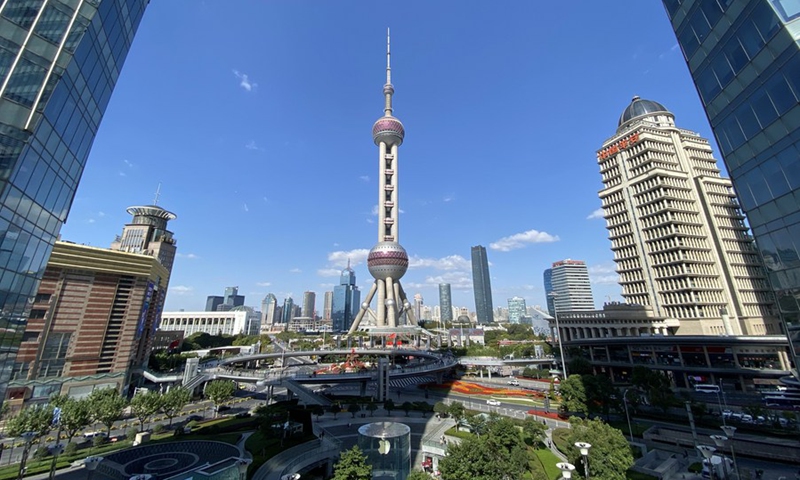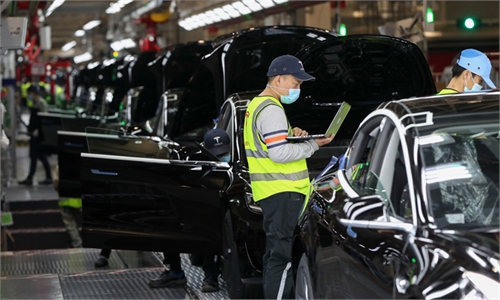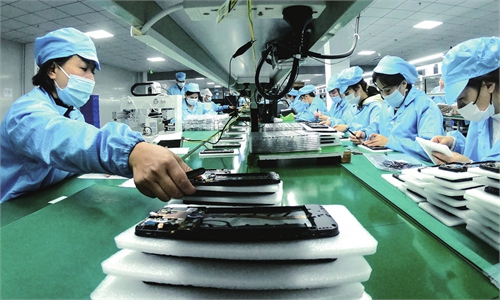China unveils new catalogue of industries to spur foreign investment; path toward modernization benefits global businesses
Path toward modernization benefits global businesses

Photo taken on Nov. 3, 2020 shows the view of the Lujiazui area of Pudong, east China's Shanghai. (Photo: Xinhua)
China on Friday released a new version of a catalogue of industries to encourage foreign investment, and continue to incentivize foreign businesses toward advanced manufacturing, the service sector and the central and western regions as the world's second-largest economy unswervingly pushes for high-level opening-up.
Analysts said the new catalogue, released just days after the conclusion of the 20th National Congress of the Communist Party of China (CPC), is one of the first batch of policy packages that vividly demonstrated the opening-up spirit and policy priority delivered by the grand gathering.
The series of moves from the central government also signaled that the path toward Chinese modernization means opportunities for the world and injecting much-needed stability into the global society, while also rebutting what some doomsayers hyped as "foreign capital flee" from China due to policy uncertainties, they noted.
The 2022 version contains 1,474 items, adding 239 and revising 167 items compared with the 2020 version. Of these, the national list has 519 items, an increase of 39 and modifying 85 items. The regional list tailored for central and western China has 955 items, adding 200 and revising 82 items compared with the 2020 version, which was approved in late 2020 and came into force in January 2021.
The new catalogue is effective from January 1, 2023.
"The revised catalogue is an important measure to stabilize foreign investment under the current situation, which is not only conducive to promoting high-level opening-up and speeding up the building of a new development pattern, but also further helps stabilize foreign investment, optimize investment structure and shores up expectation and confidence of foreign capital," the National Development and Reform Commission (NDRC), China's top economic planner, said in a statement explaining the new rule on Friday.
In the statement, the NDRC acknowledged that China's use of foreign investment, despite progressing stably, is still subject to high external pressure "due to global coronavirus flare-ups and the changing international political and economic landscape."
One of the major revisions is that the new national catalogue adds and expands on new clauses on encouraging investment components and parts as well as equipment building to improve the industrial and supply chain.
Further emphasis is placed on adding or expanding items that concern professional design, technology services and development, so as to facilitate the integrated development of services and manufacturing industries.
Also, the list designed for central and western regions expands the scope of industries in which foreign investment is encouraged, taking into account local comparative advantages in labor and special resources.
The new catalogue will further strengthen and enrich China's manufacturing industry with its clear orientation, while offering an important reference for foreign enterprises to enter the nation and reflecting the direction of China's industrial transformation and upgrading in the future, Dong Dengxin, director of the Finance and Securities Institute of the Wuhan University of Science and Technology, told the Global Times on Friday.
The emphasis on integrating industrial policies with different regions will guide foreign investors to effectively utilize local resources with more potential support, Dong said.
Dong also stressed that China is currently attracting high-end and advanced manufacturing industries, while upgrading traditional industries. China's advantages in having a complete industrial chain, highly qualified personnel, and sound infrastructure development will help attract more advanced industries to enter the country in the future.
A draft version of the 2022 "Encourage Industries" catalogue was released in May. During the revision, the NDRC and the Ministry of Commerce solicited a wide range of opinions from foreign enterprises, chambers and industry associations as well as relevant parties, and actively adopted constructive opinions after careful examination.
The new catalogue is also among a slew of measures taken by the world's second-largest economy right after the conclusion of the 20th National Congress of the CPC. On Tuesday, the NDRC, along with five other ministries, issued 15 measures to facilitate the implementation of foreign-invested projects, with emphasis placed on the manufacturing sector.
Under the premise of ensuring COVID-19 epidemic prevention and control, the NDRC has called for measures for more streamlined facilitation of international travel for foreign company executives, management, key personnel and their relatives. It also urged localities to fully use existing fast-track travel channels, including further specifying standards and procedures based on local situations.
Bai Ming, deputy director of the International Market Research Institute at the Chinese Academy of International Trade and Economic Cooperation, called for attention to be paid to temporary challenges facing the foreign business community amid uncertainties both in China and overseas, but noted that it would by no means crimp foreign investment flows into the country.
"It's increasingly the case that multinationals base their investments on not just the sheer size of the Chinese market, but also China's rising profile in the international division of industries, factoring its complete industrial system and future industrial and consumption upgrades," Bai told the Global Times.
From January to September, China's actualized FDI topped $155.3 billon, a year-on-year increase of 18.9 percent, data from the Ministry of Commerce (MOFCOM) showed on Thursday.
With the introduction of these supportive policies, coupled with the further recovery of the Chinese economy and further rationalization of the country's measures in fighting the epidemic, expectations for FDI remain positive, experts noted.


